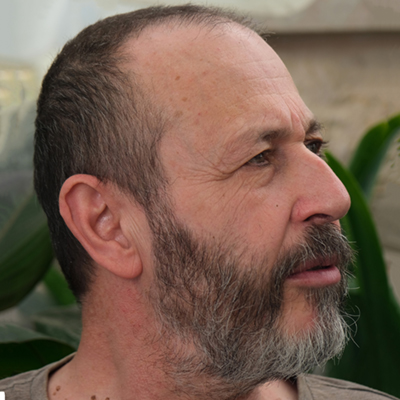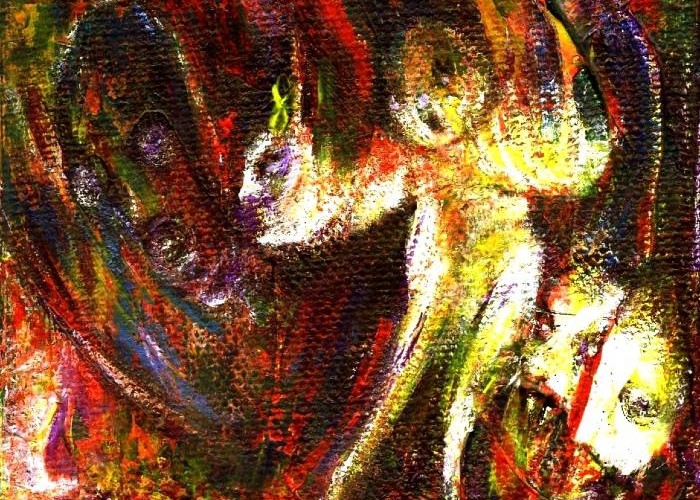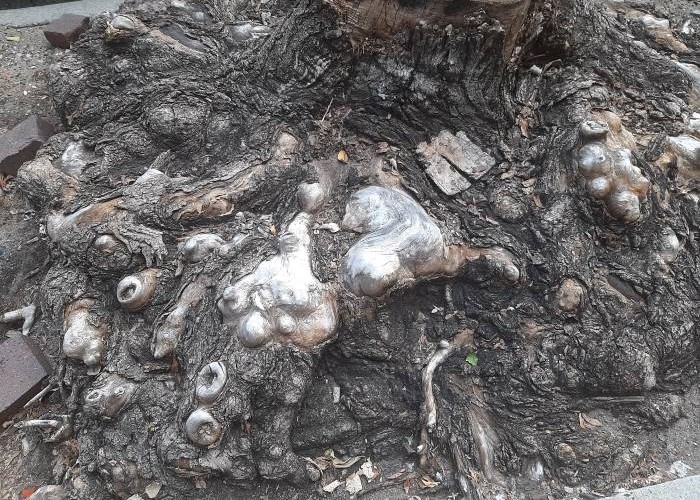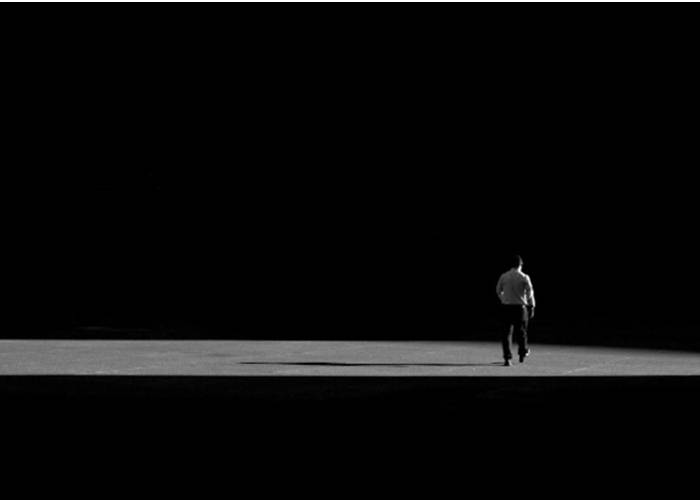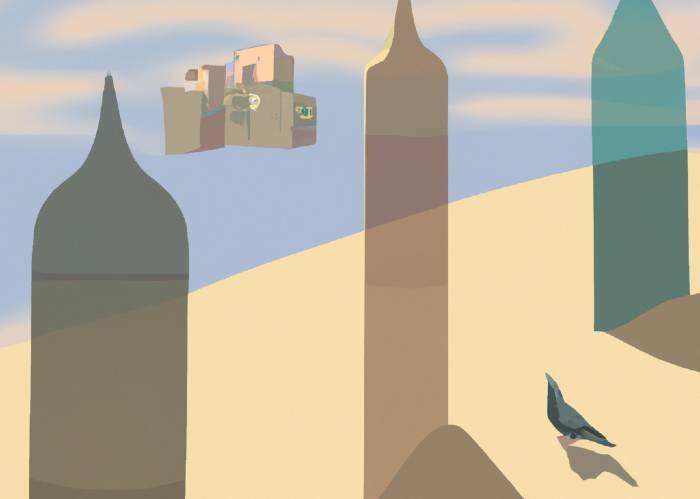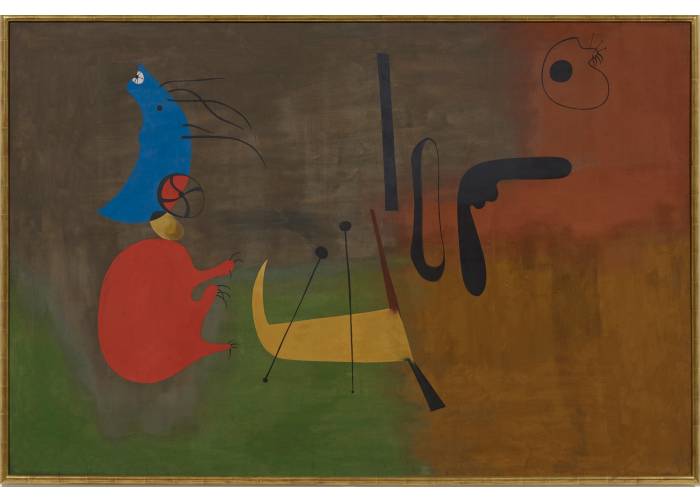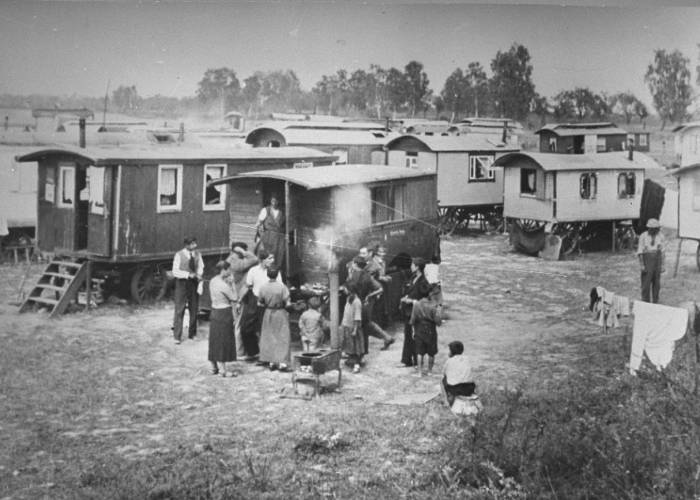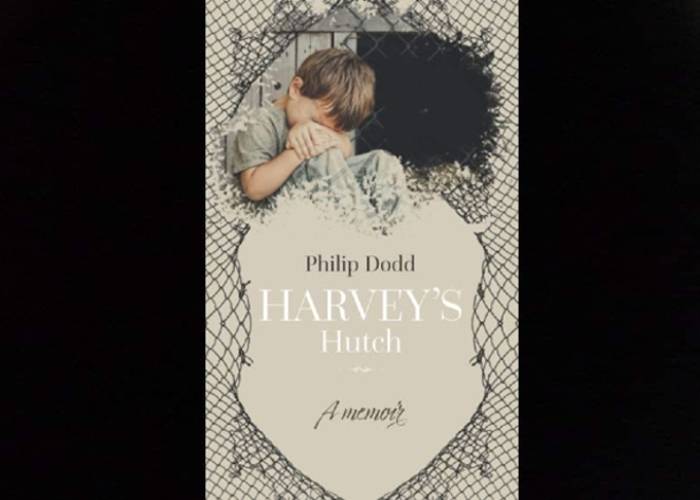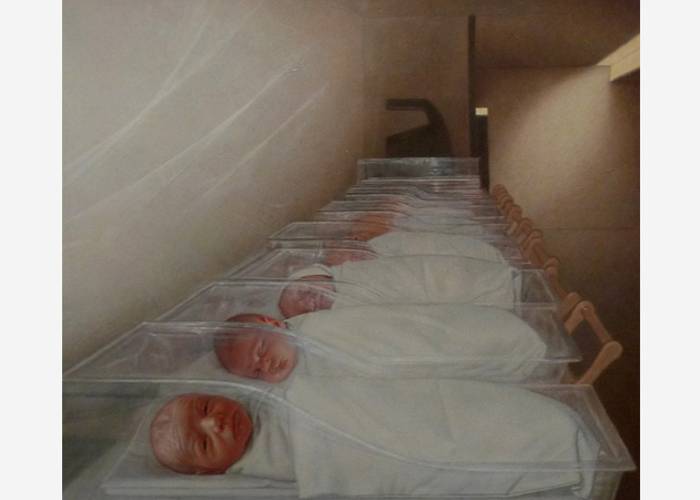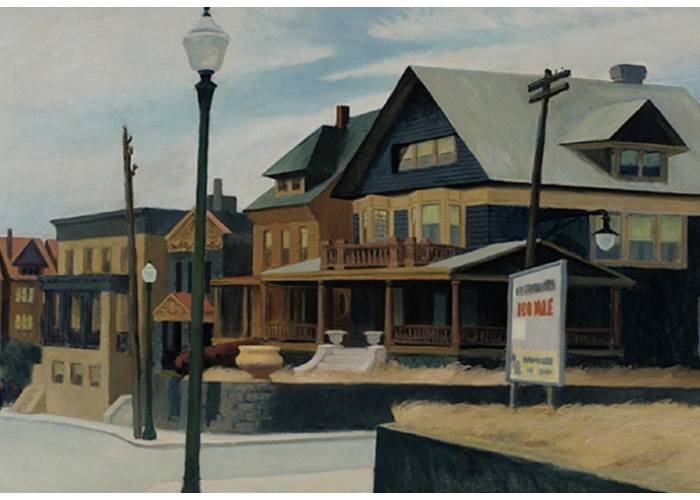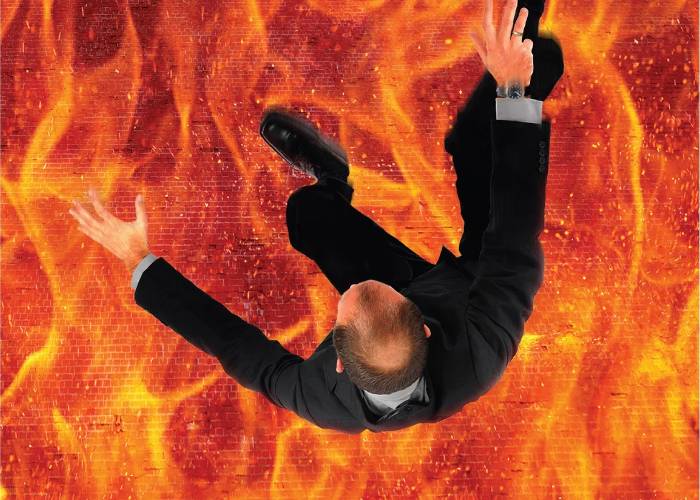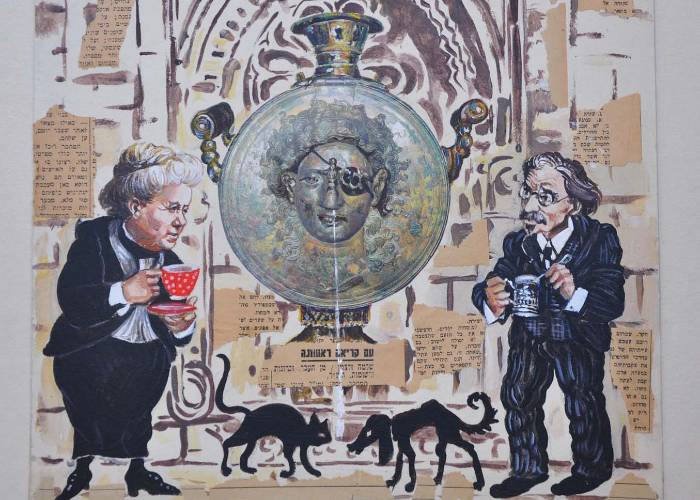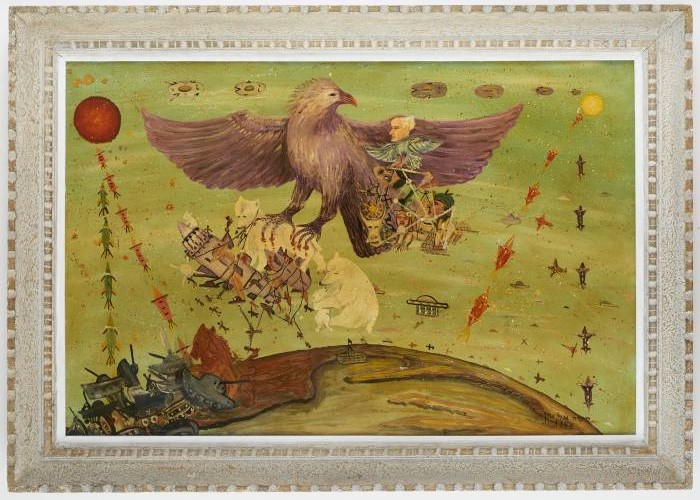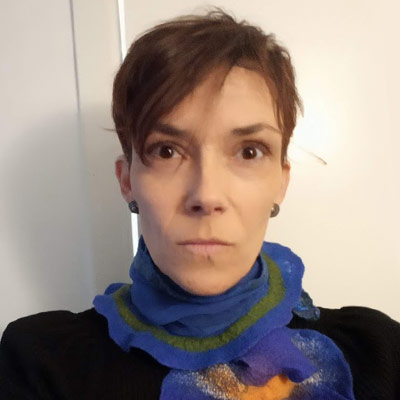Excerpt from the novel “The Notre Dame Syndrome”
Josh Stein, who’d come to Jerusalem from New York not that long ago, was firmly intent on putting on a performance where each participant would have to speak in their own language. This was meant to somehow reflect the real nature of theatre, its “polysemantic iridescent symbolism,” according to the theatre avant-gardist’s own definition. For some reason, this experiment was called “The Tailor of Haisyn”.
Stein managed to put together a very motley company, all members of which were burning with unbridled enthusiasm, and yet each of them felt out of place. “That is exactly what is needed for real theatre,” Stein would assure them. “There are enough professional odd-jobbers who know how to sew boots. We need reinforcements from those who are shocked and perplexed.”
It is probably fair to say that fortune favors the bold. Over in the States, everybody can express themselves creatively. Motl, the son of Peisl the cantor, had known this for a long time, since he was a child as it were: “My brother Elia made the acquaintance of a mohel* here. Back home, in Haisyn, the man had been a tailor, and a ladies tailor at that! Elia asked him ‘But how is that even possible?’. ‘America,’ the mohel replied.”
They rehearsed in a small basement, the entrance to which was graced by a Greek sign reading “Ζαγρεύς”**, which dated back to the time when the owner, who’d long since been arrested for smuggling, tax evasion, and dealing grass, had run an establishment selling booze on tap there. For a real theatre, even a chamber theatre, the space was rather small, but Stein simply couldn’t persuade the local authority to give him a more appropriate building, even for a short time. One day he was enviously eyeing up the old khan*** next to the railway station, the one with the faded sign above its boarded-up gates that read:
**** תעשיית עץ ומקררים וגם חשמלים – י ומ פרנקל
The next day, after visiting the public bathhouse at the foot of Betzalel Street together with the whole company, he simply couldn’t stop thinking about this amazing building – in his imagination, this was exactly the right place for the consecration of a temple of dramatic art, which would be patronized by the naked gods of Mount Olympus themselves. And so on – every abandoned structure or operational facility, from the Turkish railway station to a recently excavated tomb of the Hasmonean period, the last sanctuary of a certain shipbuilder called Jason – triggered in his mind vivid images of a stage festival. Josh Stein loved to scheme – it was a hereditary trait of his.
“And do you know, by the way, that I’m a citizen of Jerusalem in the ninth generation?” he would ask his flock rhetorically. “Let me tell you! My grandfather, Reuben Wildenstein, was one of the first compilers of calendars in Palestine and the creator of many other astonishing pipe dreams. As to my fabulous grandma, Dvoira, Debby Wildenstein… oh, she was larger than life – the author of a much-vaunted cookbook called The Taste of The Old Testament. In the States this book wаs snapped up like hotcake*****. Yessss, sometimes I see before my eyes how it was when they, my old folks, sailed for the States aboard the “Prince Albert”… And do you know who my great-grandmother was? Do you know what they called my great-grandmother in Jerusalem? Wilde Chae – that’s what they called her! Вattle-axе! And the Jews in town almost had their heads chopped off because she would sell wine to the Muslims in secret.
He then went on to tell them how, at some artistic cocktail party in New York, he’d had too much to drink and started chatting about all this to good old Rodgers and Hammerstein, yes, the ones who made “Oklahoma,” “The Sound of Music” and a whole lot of other bullshit. And? Can you imagine that? They immediately announced they’d turn Wilde Chae into a musical. My only hope is that these fossils of Broadway have long since forgotten about their intention. Otherwise… weiz mir******! Kitsch could celebrate another victory over true art.”
***
Josh Stein paid special attention to what he called stage movement, and his entire troupe, full of dramatic enthusiasm, were pouring with sweat in the airless space of the “Zagreus” as they called upon their last ounce of strength in order to fulfill the strict demands of their master.
“Imagine the sea,” demanded Stein, who was sitting cross-legged on a table and insistently conducting with a beer bottle. “An ideal sea. The sea as an idea. Mare nostrum, Passific ocean, Ostsee, whatever you like! An endless expanse of water, salt, iodine, bromide, you tell me… All kinds of sea creatures live in this boundless puddle. In a word: the sea. Work your imagination! What for? Come on, imagine that Jerusalem is standing on a rock in the middle of the sea. And now, gradually, this rock starts to sub–side, slip-slip-slip down. And the entire city, Old town, new town, the west, the east, “Ich weiß ends up in the sea, in the thick of this salty water. What’s exactly my point? It’s that now you’ll start moving as if you were underwater as if everything around was underwater and nothing apart from water existed at all. What about breathing? Never mind! You have gills! Hah. Go on, swim! Swim with each movement you make, nothing’s holding you back! This is a completely different Jerusalem, you can consider it higher or lower, it doesn’t matter! The point is not the name but the fact that it lost nine of its ten measures of gravity. There, the building of the Jewish Foundations with the Jeshurun Synagogue right behind it is swimming past you like a giant fish. There, the Jaffa and Damascus gates are writhing in the underwater current after breaking free from a live coral reef. Smooooth-ness, buoooo-yancy, the plaaasticity of just half the weight, semi-flight! Swarms of small Hassidic fish float among the water plants in their clammy neighborhoods. All the things that made you tense up, that required effort, now come easily, they are given to you, gratis. These are the movements of those who’ve entered another world, this is how the souls feel, souls that haven’t left the body behind but have brought it under total control.
And now imagine that you and everything around you are no longer situated on Earth, but on Jupiter! Who knows what that means? On Jupiter gravitation, the force of gravity, is many times greater than on Earth. It simply flattens and squeezes you, it pushes you into the planet’s surface. You try and move there. And how can you breathe there? Never mind! You have spacesuits, oxygen tanks, ich weiß. Skip it! Simply try to place one foot in front of the other, lift your arms, the right arm, then the left! It’s a bad caricature of our movements on Earth. Everything around you is pegged and welded to the surface. This is Jerusalem to the tenth degree. Everything is bent low, everything is flattened. The bell tower of the YMCA is reminiscent of the squished semi-sphere of a woman’s bra, the tower of David – of a burst condom. You’ll have to belly crawl at the speed of a snail, but without a snail’s grace, in some desperate spurts of half an inch at a time. Great!
Now, stop! Jupiter is no longer there. Space is gone altogether. There is no space at all. Everything has lost its form, color, volume, all its materiality. All that’s left is time. And why is time left? Ich weiß! Ask me something easier! Just like that. No, no. You’re right – time no longer exists either. Nothing exists anymore. In what way? Never mind! The only thing that matters is that you have nothing left except your voice. The universe has been switched off. Darkness. No, time still exists, so that you can talk in the darkness. You say whatever you want. It doesn’t matter, nobody understands anything at all. What’s left is sound without utterance, without speech, sound in the void and the darkness. Come on, chat to each other like that for ten minutes. Remember: you don’t add any message at all to your sound. Yees, like that. Gre-е-е-еat!!!
A modest clerk of the municipal authorities, who had popped into the “Zagreus” to check what exactly those young creatives were doing on the premises the city had given them, was pretty shocked by all the things he saw and heard. “They should have put on some world classic: ‘Anna Karenina,’ well I don’t know… ‘Nastasya Filippovna,’” he thought, “well, and if you absolutely have to make a show of yourself, then there are ‘Sakuntala’ and all the rest. Why put on god knows what?” But he thought it wise to keep his opinion to himself, at least in the place where it was all happening, afraid that they’d simply laugh at him. But at the department meeting, he’d definitely speak out…
***
On this day the small basement, crammed with extremely excited human individuals, was a flurry of activity. The artist, David Shmaya Himmelfarb, met with a ready market on this day. He hadn’t even finished painting bright aniline colors on a formerly white doctor’s coat hanging off the puny shoulders of a young man in a ladies’ felt hat the color of an ocean wave, when Stein, in charge of it all, already yelled directly into his ear, pointing his finger at Ahron: “There he finally is, the Tailor of Haisyn! David, take care of him, right now! All the others can wait.”
“Oh well!” David pensively examined the performer of the title-giving role, adjusted the paint-spattered glasses on his greenish nose with a multi-colored hand, and began to choose from a pile of torn clothing those elements that would be needed for the costume of the Tailor of Haisyn. The task he faced was formidable: a coat without a right sleeve, a hat, these skinny legs in shorts, the right arm, the palms, the long inexpressive neck, this unsophisticated round face that needed to be given a hint of demonism… Yes, that red stocking over there would be great, and the left leg would have to be painted blue!
“Great! Splendid! That’s it, David!” Stein announced decisively, his Napoleonic gaze never leaving the Tailor of Haisyn, who had begun to bloom with color before the eyes of the whole company. “Walk up and down, Ahron! Smoothly! Great! Oh my, what lovely legs. And now, onto the scene! Walk up and down, keep shtum so far, and do it slooooow-ly. Yeees, that’s it! And now come baaack… Now girls!”
Two female students sporting garish colors on their naked flesh, whom Ahron hardly recognized in their Eve’s costume covered in a thick layer of paint, shyly huddled in a corner, as if trying to hide behind each other.
“Come on, come on! No reason to hide!” the director called to them sternly. “The whole world is looking at you in delight!”
The two friends, giggling plaintively, crawled onto the narrow elevation that in the “Zagreus” fulfilled the role of skene and orchestra. From the other edge a second, much more relaxed naked couple was moving towards the Tailor, who’d grown speechless with amazement. Ahron had never come across either of them here before – that mulatto girl with her impressive curves shimmering in all colors of the rainbow and the gilded-all-over flat-chested beanstalk with the contemptuous look on her sky-blue face. Stein had picked up the seasoned streetwalkers last night, seducing the two, who’d lost all hope of finding clients, with the promise of immediate free grub and alcohol, as well as future world fame.
“Splendid! Come from both sides and dance slowly towards the center!” Stein commanded. “And now speak! You too, Ahron! Talk-talk-talk, chat away, don’t stop, doesn’t matter what about! Contrast! I want сontrast between the slooooow movement and the quick-quick-quick chatter!”
He started beating out a slow rhythm on a large Turkish drum, mumbling something mournful and drawn out in his rich bass.
“Stand still! And staaand! Ahaaaa-ron! Don’t stop speaking! Great! Chat away standing in place! David, is Esme ready now?!”
At this point Ahron, who’d only just found a rhythm for the pointless chatter in a mixture of Hebrew, English, and Ancient Greek, lost the gift of speech once again. He couldn’t get his head around the fact that the bare-chested pale creature with the white, green, and red cardboard box reading “Palmach Tsuba Peppers” on her head was Syoma. Syomka from Notre-Dame! Esmeralda Reichenstein from the department of world literature!
The latter had already started to pull off her salad-green knickers while trying desperately to keep her unusual headgear in place. Ahron felt a sharp pain in his chest, totally unexpected to himself.
“Stop it! – shouted Stein. Don’t take them off! It’s best this way! A little bit lower on the left! Like so! Beautiful! David, a little bit of green onto her right breast!”
For some reason, this was what enraged Ahron the most. It turned out that her knickers were the most beautiful thing about her! What a pervert!
“David! Don’t you dare smear her with paint! She’s a free individual!” he shouted, almost falling onto the formidable mulatto girl. “Sorry! Pardon! Syomka, don’t agree to any of this nonsense! This is not avant-garde theatre! The bastard’s just using you!”
“Bravo! Great!” the director applauded enthusiastically. “Well done, good Haisyn Schneider!”
“You have no Schneider! No Haisyn, no any other! I’m done with you!” the Tailor was already squeaking like an adolescent wild boar.
“Absolutely great!” Stein wouldn’t let off. “Capture it! Boy! Can you repeat that?”
But Ahron had already jumped off the podium, angrily kicked over several cans of paint, and was now rushing towards the exit, pushing everyone out of his way. He’d never been so angry in his life.
He’d had enough of those little Napoleons, mini Nebukadnezzars, dwarfish Artaxerxes, and pigmy pharaohs! They were always doing the same thing: they made up some smoke screen for their dirty games, under the cover of which they took the mick out of the naive simpletons who believed in their lofty speeches about a new epoch, higher truth, contemporary art… and all that only so that they could take advantage of young girls and humiliate everyone around while they were at it and turn themselves into great bosses, godfathers! Avant-gardist! Cobbler!
Overcome with bitterness, he already started thinking about the fact that exactly the same was going on in the higher echelons, too. Even at the state level. And why say “even”? Higher leadership was exactly where this kind of thing happened most frequently. The more petty and nasty the self-appointed leader and teacher, the more he’d puff himself up and dumbfound the little ones. If you thought about it… Who is he, that David Ben Gurion? Probably just another stein – a doughboy, full to the brim of sickening self-love, nauseating sensuality, and beyond that… beyond… there’s absolutely nothing. A small Herod, a wannabe Ahaz!
He remembered a story he’d read recently, “The Poor Man’s Lamb,” a fierce satire by Moshe Shamir. Yes, that was it. They were all like that. Even David the psalmist, the Lord’s tenor… at least that one had been, oh god forgive, a leader of his people! He probably stole from some poets that had been executed and forcibly committed to oblivion and attributed their genius poems to himself… Son of a bitch!
All his meekness had evaporated. Ahron wanted to get away as far as possible – from this theatre, from this city, from this state!
***
Without taking off his costume and stage makeup, Ahron rushed out into the alleyway, turned in the direction of Zion Square, and quickly started walking up Yaffo Street. Accidental passers-by and the regulars in the cafes stared with unconcealed curiosity at the Tailor of Haisyn in the futuristic interpretation of David Shmaya-Himmelfarb, performed by Ahron Schneider. The latter ran wherever his feet would carry him. Out of the city! As far away as possible from the repellent human race! To the mountains! Into the woods!
As soon as he reached the corner of King George Street, the city reminded of itself with hellish force. Ahron hadn’t eaten since yesterday evening, and this gave the Tailor of Haisyn cramps. If he didn’t have a bite to eat right now that’d be the end of him. But where to go? His legs – one blue, the other in a red stocking but without shoes – took him to the left all by themselves, to the corner of Agrippas Street. A bus driver, staring in admiration at this unusual natural phenomenon, almost ran over a curious pedestrian, who’d stopped recklessly for the same reason before he’d reached the pavement.
Under a heavily blackened oil painting of Chaim Weizman, in a shack carelessly added to the corner of the house, sat Shlomo, the King of Falafel. At the edge of a bright sign showing a crown made up of reddish-brown balls – the delight of the scarab – a pair of sparrows were perching like tax collectors waiting for their tribute.
“Hey, handsome!” King Shlomo shouted. “Come to the palace!”
Ahron immediately appraised his majesty’s kindness – normally those who bought falafel here would stand in the road, sometimes finding room for themselves closer to the shack or resting their elbows on the narrow counter, because there simply wasn’t any space inside. Everybody knew that this crammed building was stuffed full of priceless masterpieces of visual art, like some Hermitage or Prado.
“Come in, sit down! Here’s a cozy chair for you!”
Having said this, the king used his leg to pull up a box full of empty beer bottles for the Tailor of Haisyn.
“The first portion is on the house! You like them hot, don’t you? Spicy? Green zhug*******, red zhug – it’s all-natural. Do you like tahini? Eat, don’t be shy! Have some peppers! Onions! The second portion is also on the house! The third… I’m looking at you and I can see there’s no room for a third portion in you. I’ll paint you instead. May I? Say ‘You may,’ brother, don’t make me sad!”
Having given the Tailor of Haisyn a wrap oozing a liquid greyish broth, he moved aside David Ben-Gurion inspecting a cavalry parade in front of the Froumine House and Napoleon prancing on a camel in front of the Golden Mosque in Bagdad, set ajar a door leading to a tiny little storeroom, and started rummaging among canvasses and boxes.
“That’ll do,” said the king, pulling out a small wooden tablet with a hole near the top edge on which one could make out the familiar profile of Theodor Herzl against the thickening darkness of the Alps. “An unsuccessful piece of work, it’s been waiting to be painted over. But look, on the other side – that’s much better.”
On the reverse side, there was a picture of a Near Eastern queen with her arms wrapped around the neck of a giant peacock.
“Elisheva. She will go into the museum alongside your portrait. With Herzl in Basel, she wouldn’t have gone – that’s embarrassing, a weak composition. But with you she will, with God’s help,” he announced, turning the tablet round again and hanging it on a crooked nail in the wall. “Eat, take another spicy, my brother. Hot’s not blunt, it won’t do you any harm.
Ahron took another spicy.
“I’m closing up!” the King of Falafel shouted at a group of disappointed schoolchildren. “Time to close up. Go to Chizkiyahu!” and, turning towards Ahron, he added “Chizkiyahu, of course, sells second-rate stuff. But that’s alright, they’ll yet come across much more second-rate stuff in their lives, even third-rate stuff, time to get used to it. And the two of us have work to do.”
From under the table, he pulled out a palette with not-quite dried-out paints and two brushes.
“Sit still, eat, don’t fidget! You’re so handsome. They were generous with the paint. What can I say?! I can’t say anything, in your Betzalel some people can paint.”
While he was diligently chewing the falafel that was tickling the roof of his mouth, Ahron suddenly realized just how good he felt. He felt good in this world, in this state, in this city which he had only just wanted to run away from, wherever his feet would go. Why did he care about Stein and his striptease, about Ben-Gurion, about Magid, about all these megalomaniac dwarfs, when he could just sit here, where there’s always room for one more, in the Falafel Kings’s backyard palace and simply enjoy his life…
“We don’t know what ‘Oll rright’ means. But the Tailor of Haisyn says that he knows. ‘Oll rright’ means it doesn’t matter, which in our language means ‘nu shoin’ or “soll es sein azoi or simply ‘take it easy’. That means that everything will be fine,” Ahron remembered and smiled.
___________________
ENDNOTES
*A mohel — a person who carries out ritual circumcision (Hebrew, Yiddish)
** Ζαγρεύς – Zagreus, an ancient Greek god identified with Dionysus (the so-called first-born Dionysus) and Bacchus in Roman mythology
*** Khan – hostel (Arabic)
**** “Woodwork and of fridges and also of electrical – I and M Frenkel” (distorted Hebrew)
***** The italics here and elsewhere indicate English words and phrases in the original text.
****** weiz mir! – woe to me! (Yiddish)
*******zhug – a hot sauce originating in Yemeni cuisine
